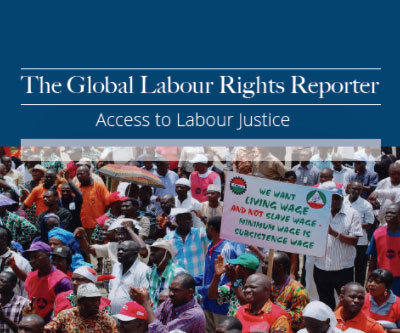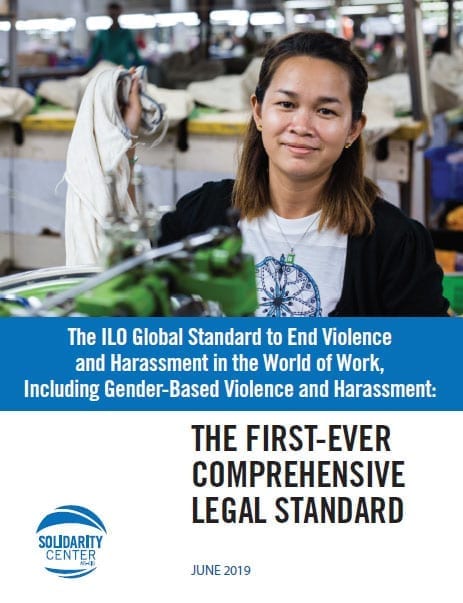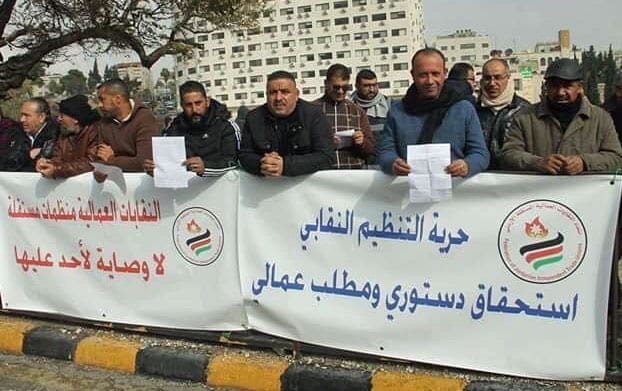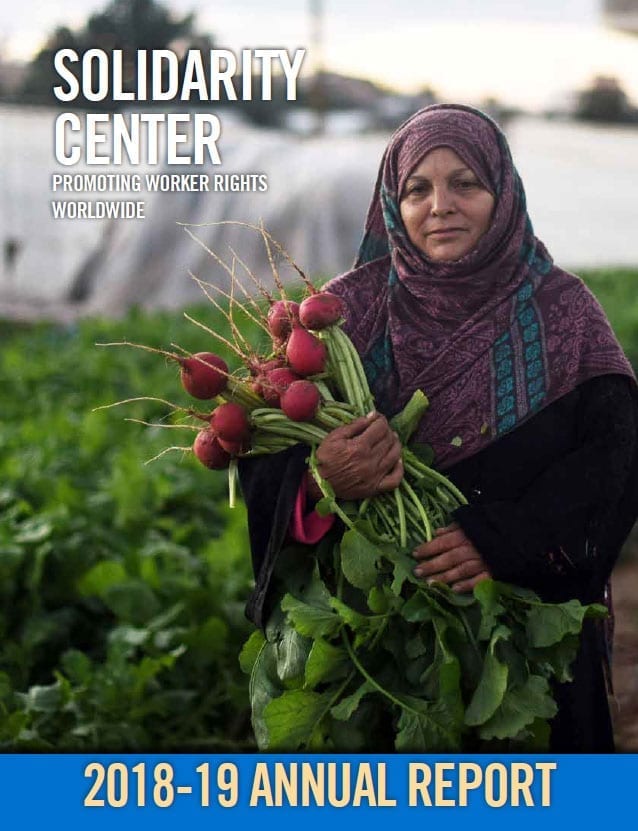
Feb 3, 2021
Labor lawyers and other worker rights advocates from around the world took part in the launch of a new law journal dedicated to advancing justice for workers.
The Global Labour Rights Reporter, a project of the Solidarity Center’s International Lawyers Assisting Workers (ILAW) Network, intends to be a global forum for labor and employment law practitioners, who also will grapple with the legal and practical issues that directly affect workers and their organizations.

The journal “gives us the language to fight our battles, it gives us the language to discuss our struggles”—Paapa Danquah
Authors who contributed to the first issue, with its theme, “access to justice,” yesterday shared their contributions to the journal, which includes 10 articles and is available online in English, French and Spanish.
“The labor movement is about expanding justice for all workers,” Solidarity Center Executive Director Shawna Bader-Blau said in opening remarks. “The network is the first effort to bridge and build a pro-labor network of lawyers that has labor justice at its heart.”
The journal “gives us the language to fight our battles, it gives us the language to discuss our struggles,” said Paapa Danquah, legal officer for the International Trade Union Confederation (ITUC).
The Solidarity Center launched the ILAW Network in December 2018 as a global hub for worker rights lawyers to exchange ideas and develop strategies to best represent the rights and interests of workers and their organizations. Since then, more than 600 hundred individuals and organizations from more than 70 countries have joined.
Justice Delayed, Justice Denied

Ensuring reparations are efficient and timely is key to achieving worker justice, says Matías Cremonte. Credit: Solidarity Center
Several participants discussed workers’ lack of access to courts and the legal process as a major block for workers attaining justice.
For instance, it took 22 years to get a judgment in the case of a manufacturing plant in Brazil, where 60 workers were killed, 59 of them women, said Matías Cremonte, regional vice-president of the Latin American Association of Labor Lawyers.
“When it came time to enforce the decision, it couldn’t be done because the conditions don’t exist anymore,” he said. “Unjustified backlogs and delays by the government led to very profound damage.” Ensuring reparations are efficient and timely is key to achieving worker justice, he said.
Cremonte and María Paula Loranzo co-authored “The Right to Fair and Satisfactory Working Conditions: Risk Prevention and Access to Justice,” which explores workers’ access to compensation for occupational safety and health violations in Argentina, especially since the COVID-19 pandemic.

Raisa Liparterliani shared how unions in Georgia succeeded in restoring many worker rights that were eliminated. Credit: Solidarity Center
In addition to the institutional and practical challenges the judiciary faces, “it is not uncommon that employers will maintain a blacklist of the so called unwanted and dangerous—those who have applied to court to defend their rights,” Raisa Liparterliani, deputy chairperson of the Georgian Trade Union Confederation, wrote in the journal.
Speaking today, Liparteliani also documented concrete measures to address worker rights, sharing how unions succeeded in restoring many worker rights that were eliminated during 2005 reforms.
Discussing his article on Zimbabwean court practices, scholar Munyaradzi Gwisai said limited access to courts has denied workers a cornerstone of labor justice. “You can have rights in the constitution and labor rights, but they can be frustrated by the judiciary.”
Holding Global Supply Chains Accountable
By bringing together labor lawyers and worker rights activists, the Global Labour Rights Reporter seeks to share new strategies for ensuring worker justice, and Avery Kelly at the Corporate Accountability Lab described one such effort to enforce the legal rights of garment workers and others in the corporate supply chain.
The program, which sought to address the lack of enforcement in supplier codes of conduct, involved 14 U.S. companies, including major apparel brands, signing contracts giving supply chain workers legal rights to enforce the supplier codes of conduct. Kelly and her co-authors documented the case study in their journal article.

Sep 5, 2019
The Nigerian Labor Congress (NLC) hosted the founding of the Nigeria chapter of the International Lawyers Assisting Workers Network (ILAW) this week. The event was part of the nationwide union’s efforts to strengthen global ties to advance worker rights. More than 20 legal practitioners and scholars attended the event and are among ILAW’s newest members.

The Nigerian Labor Congress hosted the founding of the Nigeria chapter of ILAW this week. Credit: Moses Umaru, NLC
Speaking at a press conference in Abuja to announce the partnership, NLC President Ayuba Wabba said ILAW will provide an opportunity for lawyers in the country to connect directly with the International Labor Organization (ILO) and with labor lawyers around the world. “The whole essence of working in synergy is to continue to provide for the interest of workers, and defend human rights,” he said.
ILAW, a project of the Solidarity Center, now includes nearly 300 members from more than 50 countries. Launched last November, ILAW seeks to bring together legal practitioners and scholars to best represent the rights and interests of workers and their organizations and effectively advocate for workers in a global working environment. The ILAW Network is supported by an advisory board, comprised of 20 lawyers from 20 countries, with expertise on a broad range of legal matters.
In Nigeria, where jobs increasingly are contracted out and workers are forced into low-paying, insecure informal economy work, Wabba sees ILAW as another tool for strengthening the labor movement by coordinating efforts to counter the anti-worker moves by employers.
The challenges workers face in Nigeria are similar to those around the world—making collaboration of lawyers in multiple legal jurisdictions essential, says Jeff Vogt, Solidarity Center rule of law director and ILAW board chair.
“ILAW will always stand for, and protect the rights of workers and trade unions across the globe and in Nigeria,” says Vogt.

More than 20 legal practitioners and scholars took part in launching the country’s ILAW chapter. Credit: Moses Umaru, NLC
The Federal Capital Territory chapter of the Nigerian Bar Association also welcomed the partnership. “As an association of lawyers in Nigeria, we want to be part of this network,” said attorney Emmanuel Adedeyi.
In short, said Wabba, the partnership with ILAW means that “when you are in the courtroom as lawyers, we will also be on the street to compliment what you are doing in the courtroom—and that is the whole essence of us working together.”
ILAW membership includes access to legal resources and worker rights lawyers around the world. Find out more.

Jun 11, 2019
A Solidarity Center legal analysis shows the proposed ILO convention on gender-based violence and harassment at work is necessary because no global binding instrument exists that comprehensively addresses violence and harassment in the world of work, including gender-based violence and harassment.
Download here.

Feb 19, 2019
Jordan’s Senate is set to consider amendments to the country’s labor code that will restrict worker’ fundamental rights to freedom of association and collective bargaining and that fail to address Jordan’s longstanding limitations on worker rights, according to the International Trade Union Confederation (ITUC), which is joined by global unions in condemning the proposal and urging legislators to withdraw it.
The amendments, passed in recent weeks by the country’s House of Representatives, increase restrictions on freedom of association by requiring the Ministry of Labor to approve union bylaws when they register with the government. The amendments also give the Labor Ministry the authority to dissolve unions and impose fines and imprisonment for those who continue union activities for a dissolved union.
(Tell the Jordan government to bring the country’s labor laws in line with international standards.)
Since 1976, no new trade union has been allowed to form in Jordan, which also prohibits migrant workers—who comprise a large portion of the Jordanian workforce—from forming unions. Jordan labor laws also permit unions in only 17 sectors set by the government, and only one union per sector is allowed to represent workers. Most recently, the government rejected the registration of an independent union in the agriculture sector because agriculture is not on the government’s list.
The International Labor Organization (ILO), which also sent Jordan’s minister a memo detailing the amendments’ violations of international labor law, has repeatedly pointed out Jordan’s failure abide by ILO conventions on freedom of association and collective bargaining.
Independent unions in Jordan are also pushing back on the proposed amendments, with workers protesting at parliament and union leaders writing open letters to the government urging lawmakers follow international labor standards.
Read the Jordan Federation of Independent Trade Unions press release and letter (Arabic) and the Jordanian Network for Human Rights letter (Arabic).










